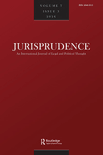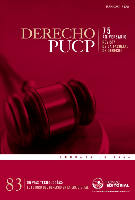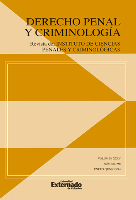
Justicia
Scope & Guideline
Connecting scholars and practitioners for social justice.
Introduction
Aims and Scopes
- Human Rights and Social Justice:
A core area of the journal, focusing on the evolution and application of human rights within different contexts, including post-conflict scenarios, gender violence, and the rights of marginalized groups. - Legal Frameworks and Reforms:
Examines the historical and contemporary legal frameworks that govern societal behavior, including constitutional reforms, property rights, and the impact of new technologies on the legal landscape. - Criminal Justice and Legal Procedures:
Investigates the dynamics of criminal justice systems, including the effectiveness of legal procedures, victim rights, and the implications of emerging issues such as cybercrime and artificial intelligence. - Interdisciplinary Approaches to Law:
Encourages interdisciplinary research that integrates insights from sociology, psychology, economics, and political science to enrich the understanding of legal challenges and societal impacts. - Environmental Law and Rights:
Focuses on the legal aspects of environmental protection and sustainability, emphasizing the legal rights of nature and the management of natural resources in the context of human rights.
Trending and Emerging
- Artificial Intelligence and Law:
A significant increase in discussions surrounding the implications of artificial intelligence on legal systems, including ethical considerations, legal liabilities, and regulatory frameworks. - Gender-Based Violence:
Growing attention to gender violence issues, particularly in the context of legal protections, social justice, and the role of the judiciary in addressing these crimes. - Migration and Refugee Law:
Emerging themes related to the legal challenges faced by migrants and refugees, particularly in light of the Venezuelan diaspora and the socio-political dynamics in Latin America. - Post-Conflict Justice:
A trend towards exploring justice mechanisms in post-conflict societies, focusing on reparations, victim rights, and the restoration of social order. - Cybercrime and Digital Rights:
Increasing focus on the legal implications of cybercrime, digital rights, and the impact of technology on privacy and security, reflecting the challenges of the digital age.
Declining or Waning
- Traditional Legal Education:
The focus on conventional legal education models appears to be waning, as the journal increasingly embraces innovative methodologies and interdisciplinary approaches to legal studies. - Historical Legal Analysis:
While historical perspectives on legal issues remain important, there is a noticeable decrease in papers solely dedicated to historical analyses, as contemporary issues take precedence. - Private International Law:
The exploration of private international law topics has diminished, possibly due to a growing focus on domestic legal frameworks and the implications of globalization on local laws. - Disciplinary Law:
There is a reduction in publications specifically addressing disciplinary law, suggesting a shift towards broader discussions around legal reform and human rights.
Similar Journals

Revista CES Derecho
Shaping Tomorrow's Legal Landscape with Scholarly Rigor.Revista CES Derecho is a distinguished academic journal published by UNIV CES, focused on the multifaceted field of law. Situated in Medellin, Colombia, this journal serves as a vital platform for disseminating innovative research and critical analysis in legal studies, encouraging the exchange of ideas among scholars, practitioners, and students alike. With its commitment to open access, the journal provides unfettered access to its content, ensuring that its valuable insights reach a diverse audience. Although specific metrics such as H-Index and Scopus rankings are currently unavailable, the Revista CES Derecho aims to enhance the quality of legal education and practice by fostering scholarly discourse and informing progressive legal thought. Researchers and practitioners are invited to contribute to this dynamic publication, further enriching the discourse in the ever-evolving landscape of law.

DUKE LAW JOURNAL
Elevating discourse through rigorous analysis.DUKE LAW JOURNAL is a premier scholarly journal published by Duke University, dedicated to advancing the field of law through rigorous research and critical analysis. With an ISSN of 0012-7086 and an E-ISSN of 1939-9111, this distinguished journal has established itself as a vital resource for legal scholars, practitioners, and students alike. As a member of the top quartile (Q1) in Law for 2023 and ranking 267 out of 1025 in the Scopus database, the journal showcases high-impact articles that contribute to the contemporary discourse on legal theory, practice, and reform. While it does not currently offer open access, its rich archive since 1978 provides invaluable insights into significant legal developments in the United States and beyond. The DUKE LAW JOURNAL serves not only as a repository of knowledge but also as a forum for diverse perspectives, making it an essential tool for anyone engaged in the legal profession or academia.

Revista Latinoamericana de Derecho Social
Fostering Dialogue on Social Justice Through Legal InsightsRevista Latinoamericana de Derecho Social, published by the Nacional Autónoma de México, Instituto de Investigaciones Jurídicas, is a vital academic resource in the field of Law, particularly focused on social legal issues in the Latin American context. With an ISSN of 1870-4670 and an E-ISSN of 2448-7899, this journal has been actively contributing to legal scholarship since its inception in 2016 and is set to continue until 2024. Although it currently holds a Q4 ranking in the 2023 Law category and is positioned within the 10th percentile of Scopus rankings, the journal offers invaluable insights and rigorous analysis on legal frameworks and practices affecting social justice in Mexico and beyond. Though it operates as a regular publication, researchers and practitioners can access its articles to enhance their understanding of contemporary legal challenges. We encourage scholars, students, and legal professionals interested in social law and the interplay of legal systems in Latin America to consider this journal as a significant avenue for disseminating and engaging with critical legal research.

Ius Humani-Revista de Derecho
Championing Open Scholarship in Human RightsIus Humani-Revista de Derecho, published by Universidad Hemisferios, serves as a vital platform for discourse in the field of human rights law and its various dimensions. With an Open Access policy established since 2008, this journal ensures that scholarly articles, critical reviews, and original research are readily accessible to a global audience, fostering collaboration and innovation among researchers, professionals, and students alike. Although the journal is based in Quito, Ecuador, its reach extends internationally, making significant contributions to the understanding and application of human rights in legal frameworks. While it is still developing in terms of its HIndex and Scopus rankings, Ius Humani is poised to provide essential insights and discussions that reflect pressing legal issues and emerging trends in human rights law. Join the community of scholars engaging with this important field through Ius Humani, where knowledge is freely shared and impactful conversations are sparked.

HARVARD LAW REVIEW
Pioneering Critical Perspectives in Law.HARVARD LAW REVIEW, an esteemed publication by the Harvard Law Review Association, stands as a cornerstone of legal scholarship in the United States, boasting an impressive ISSN of 0017-811X and E-ISSN 2161-976X. Renowned for its rigorous editorial standards and comprehensive analyses, this journal occupies the prestigious Q1 category in Law, ranking #149 out of 1025 in Scopus, which places it in the 85th percentile among its peers in the Social Sciences Law category. With a publication history stretching from 1973 to 2024, it consistently features groundbreaking articles, influential essays, and critical commentaries that shape contemporary legal thought. Although not an open-access journal, HARVARD LAW REVIEW remains indispensable for researchers, professionals, and students who seek to engage deeply with the evolving landscape of law. Its rigorous academic focus empowers scholars and practitioners alike, making it a vital resource in the field.

Vox Juris
Fostering dialogue on contemporary legal issues.Vox Juris is a premier academic journal dedicated to the field of legal studies, published by the esteemed Universidad San Martin de Porres, Fondo Editorial. Since its transition to Open Access in 2015, it has significantly enhanced the dissemination of high-quality legal research and scholarship, providing unrestricted access to a wide audience of researchers, professionals, and students globally. Although the journal's H-index and specific scope are currently unspecified, it actively contributes to the discourse surrounding various facets of law, including theory, applications, and interdisciplinary perspectives. Located in the heart of Peru at SEDE LIMA JR LAS CALANDRIAS N0 151291 SANTA ANITA, Vox Juris serves as a vital resource for those seeking to explore and advance their understanding of contemporary legal issues. Its commitment to promoting scholarly dialogue makes it an indispensable platform for both emerging and established voices in the legal community.

University of Bologna Law Review
Transforming Legal Scholarship for a Global AudienceUniversity of Bologna Law Review, published by UNIV STUDI BOLOGNA, ALMADL JOURNALS, serves as a pivotal platform for legal scholars and practitioners in the field of law. Established as an Open Access journal in 2016, it has committed itself to disseminating high-quality research and fostering vibrant discussions around contemporary legal issues. Based in Italy, the journal addresses a broad spectrum of topics within the realm of law, enhancing its reach and applicability. Although it currently holds a Q4 ranking in the 2023 law category according to Scopus, this reflects its potential for growth and contribution to academic discourse. The journal’s h-index and precise scope will be developed as it continues to publish groundbreaking research up to 2024. With an aim to cultivate educational resources and foster innovative legal thought, the University of Bologna Law Review is an essential resource for researchers, professionals, and students alike, harnessing the power of open access to engage a global audience.

Jurisprudence-An International Journal of Legal and Political Thought
Cultivating Rigorous Scholarship in JurisprudenceJurisprudence: An International Journal of Legal and Political Thought, published by ROUTLEDGE JOURNALS, TAYLOR & FRANCIS LTD, serves as a vital platform for scholars and practitioners engaged in the ever-evolving discourse of legal and political theory. With its ISSN 2040-3313 and E-ISSN 2040-3321, this esteemed journal spans a converged period from 2015 to 2024, and has established itself in the Q2 quartile of the law category, ranking #359 out of 1025 and placing in the 65th percentile as per Scopus metrics in 2023. Based in the United Kingdom, this journal is dedicated to exploring the intricate relationships between law, political ideologies, and contemporary societal issues, thereby fostering interdisciplinary dialogue that is crucial for navigating today’s complex legal landscapes. Although it does not currently provide an open access option, Jurisprudence continues to attract a broad readership of researchers, professionals, and students seeking rigorous scholarship and practical insights into legal and political thought. With its strong impact within the field, the journal plays a significant role in shaping future discussions and advancements in legal studies.

Derecho PUCP
Fostering innovative scholarship in law.Derecho PUCP is a distinguished open access journal published by the Pontificia Universidad Católica del Perú, specifically from the Faculty of Law. With a commitment to advancing legal scholarship, this journal has been an essential resource in the field of law since 2005, providing researchers, practitioners, and students with access to critical analyses and discussions on various legal topics. Based in Lima, Peru, Derecho PUCP holds a prestigious position with a Q2 ranking in the Law category, reflecting its impactful contributions to the social sciences, particularly in the legal domain. The journal publishes cutting-edge research and promotes innovative discourse, aiming to foster academic excellence and engage with contemporary legal challenges. As it continues to converge into its future issues from 2019 to 2024, Derecho PUCP exemplifies a vital platform for those committed to the pursuit of legal knowledge and research.

Derecho Penal y Criminologia
Exploring the Intersection of Law and SocietyDerecho Penal y Criminología is a distinguished academic journal published by UNIV EXTERNADO COLOMBIA, dedicated to advancing the fields of criminal law and criminology. Since its inception in 1999, this Open Access journal has provided a platform for researchers, practitioners, and students to share innovative ideas, empirical studies, and critical analyses pertinent to contemporary issues in these fields. With a commitment to disseminating valuable research without barriers, the journal serves as an essential resource for those looking to deepen their understanding of criminal justice processes and criminological theories. Although the H-index and specific rankings remain to be detailed, the journal is positioned as a vital contributor to ongoing discussions and developments in penal law and criminology, making it a must-read for professionals seeking to engage with the latest scholarly work. The journal welcomes submissions and encourages robust dialogue among its readership in the quest for justice and effective legal reform.